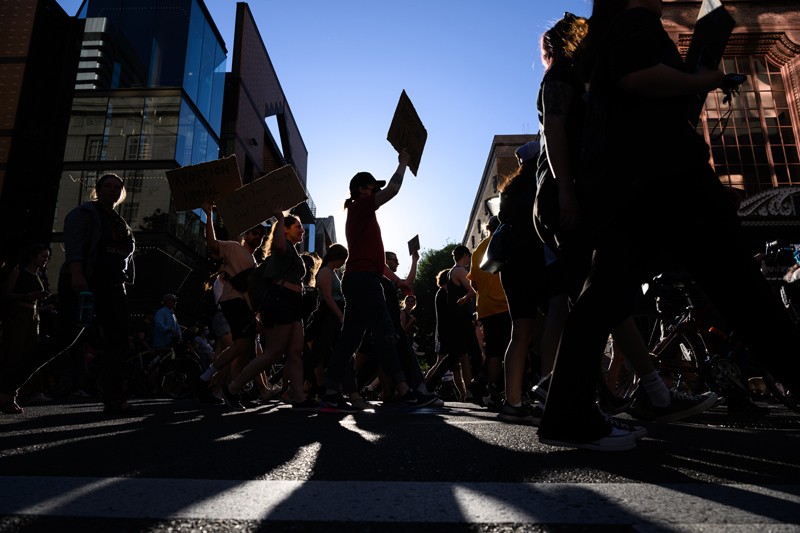The US Supreme Court ruling that removed constitutional protections for access to abortion has prompted calls for scientific conferences to boycott states that have now banned or severely restricted the procedure.
So far, however, there is little evidence that many organizers are planning to cancel or relocate scheduled scientific conferences.
Soon after the ruling on 24 June, some scientists took to Twitter to call for conference relocations. Gavin Sherlock, a geneticist at Stanford University in California, tweeted: “Calling on all conference organizers and professional scientific societies — please do not organize conferences in states that restrict women’s rights.” Elizabeth Jacobs, an epidemiologist at the University of Arizona in Tucson, tweeted: “Scientists and healthcare professionals should not attend or hold conferences in any state that doesn’t offer all types of healthcare to women. It’s a repudiation of science, and one of our pregnant colleagues could be arrested for having complications in such a state.”
At least one organization has already moved a meeting over the issue of abortion rights. In May, the American College of Obstetricians and Gynecologists (ACOG) announced that it was relocating its April 2023 conference, slated to be held in New Orleans, Louisiana. The state is among 13 that had enacted ‘trigger laws’ that would automatically ban abortions at all stages of pregnancy if the Supreme Court removed constitutional protections on the procedure.
Molly Meegan, general counsel and chief legal officer at the ACOG in Washington DC, explained the decision in a statement. “Holding the nation’s largest gathering of obstetrician-gynecologists in a location where the provision of evidence-based care is banned and/or subject to criminal or other penalties is directly at odds with our mission and values,” she said. “We also hope that others within the medical community will join us to show the consensus of opposition to restrictive laws and bans.”
Trigger states
Table of Contents
The Clinical Immunology Society, which has announced that its 2023 annual meeting will be held in St Louis, Missouri, another of the ‘trigger states’, did not respond to a request from Nature for comment. The American Society for Microbiology, which is planning to hold its 2023 ASM Microbe conference in Houston, Texas, a third trigger-law state, also did not respond.
The American Society of Clinical Oncology, which has a Best of ASCO Annual meeting scheduled for 22–23 July in New Orleans, says that it is “not planning to cancel or relocate its upcoming meeting” at this time.
David Barnstone, a spokesperson for the American Physical Society (APS) in College Park, Maryland, says that the organization has no plans to relocate a meeting of its Division of Nuclear Physics scheduled for October in New Orleans. He notes that the Division of Atomic, Molecular, and Optical Physics met earlier this year in Orlando, Florida, “despite recent actions by Florida politicians that are inconsistent with APS values” — specifically, passing a law that makes it illegal for public-school teachers to discuss sexual orientation or gender identity in early grades.
In a statement before the meeting, the APS acknowledged that some members wanted the meeting to be relocated, but, it said, “it would be impossible to move the meeting at this late date”, adding that “our presence in Orlando will send a message to our members who live in Florida that we are there to support them as opposed to avoiding coming there at all”.
Some of the most popular venues for scientific conferences — including San Francisco, California; Chicago, Illinois; Washington DC and Boston, Massachusetts — are in states where abortion rights remain strongly protected, meaning that conference organizers won’t be faced with a difficult choice. The 2023 annual meeting of the American Association for the Advancement of Science, for example, will be in Washington DC.
Impact of boycotts
Not all scientists support boycotting states with strict abortions laws. Irene Newton, a microbiologist at the University of Indiana Bloomington and editor-in-chief of the ASM journal Microbiology Resource Announcements, says the ASM shouldn’t cancel its 2023 conference in Houston. She notes that her own laboratory is in a politically conservative ‘red’ state that will probably enact strict anti-abortion laws in the near future. “I understand that people want to make a difference and do not want to feel powerless,” she says. “Boycotts directly hurt the scientific societies that we are part of and hurt trainees. If we never held scientific meetings in red states, we shun many scientists who live and work there.”
Sherlock says his original rationale for supporting conference boycotts of states that ban or severely restrict abortions was that the ensuing loss of revenue might put pressure on politicians to rethink their policies. But as online discussions among scientists have continued, he says he now sees a more fundamental reason for scientific societies and conference organizers to avoid states that restrict reproductive health care. “I don’t believe that women who are or may be pregnant can safely travel to such states,” he says. “If we have colleagues who can’t attend such conferences, then none of us should be attending.”

